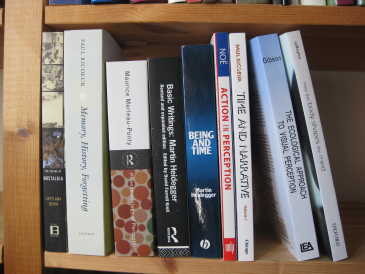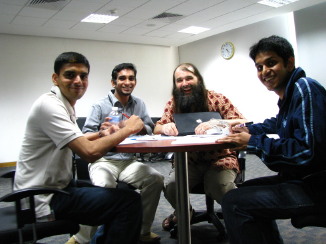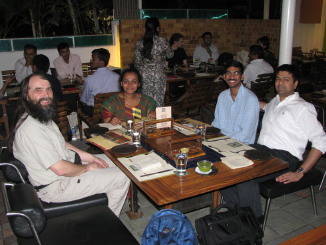Candles and firelight during Earth Hour last Saturday

Candles and firelight during Earth Hour last Saturday

Got some books to fill my evenings when I’m in Rome during May, mostly about physicality and relating to DEPtH project.

Several classics about the nature of action in the physical world:
A couple more with a human as action system perspective, that seem to be well reviewed (and I’m guessing easier reads!):
Finally three about memories: linking generally to memories for life and also designing for reflection, but looking at them more specifically in relation to Haliyana‘s photologing studies.
Will report on them as I go 🙂
A few days ago our neighbour told us this joke:
“Why did the dinosaur cross the road?”
…
It reminded me yet again of the incredible richness of apparently trivial day-to-day thought. Not the stuff of Wittgenstein or Einstein, but the ordinary things we think as we make our breakfast or chat to a friend.
There is a whole field of study looking at computational humour, including its use in user interfaces1, and also on the psychology of humour dating back certainly as far as Freud, often focusing on the way humour involves breaking the rules of internal ‘censors’ (logical, social or sexual) but in a way that is somehow safe.
Of course, breaking things is often the best way to understand them, Graeme Ritchie wrote2:
“If we could develop a full and detailed theory of how humour works, it is highly likely that this would yield interesting insights into human behaviour and thinking.”
In this case the joke starts to work, even before you hear the answer, because of the associations with its obvious antecessor3 as well as a whole genre of question/answer jokes: “how did the elephant get up the tree?”4, “how did the elephant get down from the tree?”5. We recall past humour (and so neurochemically are set in a humourous mood), we know it is a joke (so socially prepared to laugh), and we know it will be silly in a perverse way (so cognitively prepared).
The actual response was, however, far more complex and rich than is typical for such jokes. In fact so complex I felt an almost a palpable delay before recognising its funniness; the incongruity of the logic is close to the edge of what we can recognise without the aid of formal ‘reasoned’ arguments. And perhaps more interesting, the ‘logic’ of the joke (and most jokes) and the way that logic ‘fails’, is not recognised in calm reflection, but in an instant, revealing complexity below the level of immediate conscious thought.
Indeed in listening to any language, not just jokes, we are constantly involved in incredibly rich, multi-layered and typically modal thinking6. Modal thinking is at the heart of simple planning and decision making “if I have another cake I will have a stomach ache”, and when I have studied and modelled regret7 the interaction of complex “what if” thinking with emotion is central … just as in much humour. In this case we have to do an extraordinary piece of counterfactual thought even to hear the question, positing a state of the world where a dinosaur could be right there, crossing the road before our eyes. Instead of asking the question “how on earth could a dinosaur be alive today?”, we are instead asked to ponder the relatively trivial question as to why it is doing, what would be in the situation, a perfectly ordinary act. We are drawn into a set of incongruous assumptions before we even hear the punch line … just like the way an experienced orator will draw you along to the point where you forget how you got there and accept conclusions that would be otherwise unthinkable.
In fact, in this case the punch line draws some if its strength from forcing us to rethink even this counterfactual assumption of the dinosaur now and reframe it into a road then … and once it has done so, simply stating the obvious.
But the most marvellous and complex part of the joke is its reliance on perverse causality at two levels:
temporal – things in the past being in some sense explained by things in the future8.
reflexive – the explanation being based on the need to fill roles in another joke9.
… and all of this multi-level, modal and counterfactual cognitive richness in 30 seconds chatting over the garden gate.
So, why did the dinosaur cross the road?
“Because there weren’t any chickens yet.”
Was thumbing through Brain Cantwell Smith’s “On the Origin of Objects”1, and came across the following quote:
“One notices, if one will trust one’s eyes, the shadow cast by language upon truth.”
Auden, “Kairos & Logos“
This reminded me of my own ponderings as a school child (I can still hear the clank of china as I was washing cups in the church at the time!) as to whether I would be able to think more freely if I knew more languages and thus had more words and concepts, or whether, on the contrary, my mind would be most clear if I knew no language and was thus free of the conceptual straitjacket of English vocabulary. Of course all shades of Sapir-Whorf (although I didn’t know the term at the time), and now I hold a somewhere in-between view – language shapes thought but does not totally contain it2. Is that the moderation of maturity, or compromise of age?
Fiona @ lovefibre just forwarded me a link to a petition about retained firefighters, who evidently may be at risk as the right to opt out of European working time directive is rescinded. Checking through to the Hansard record, it seems this is really a precautionary debate as the crunch is not until 2012.
However, I was wondering how that was going to impact UK academia if, in 2012, the 48 hour maximum cuts in.
It may make no difference if academics are not required to work more than 48 hours, just decide to do so voluntarily. However, this presumably has all sorts of insurance ramifications – if we do a reference or paper outside the ‘official hours’ would we be covered by the University’s professional indemnity. I guess also, in considering promotions and appointments, we would have to ‘downgrade’ someone’s publications etc. to only include those that were done during paid working hours otherwise we would effectively be making the extra hours a requirement (as we currently do).
The university system has become totally dependent on these extra hours. In a survey in the early 1990s the average hours worked were over 55 per week, and in the 15 years since then this has gone up substantially. I would guess now the average is well over 60, with many academics getting close to double the 48 hour maximum. I recall one colleague, who had recently had a baby, mentioning how he had cut back on work; now he stops work at 5pm … and doesn’t start again until 7:30pm, his ‘cut back’ week was still way in excess of 60 hours even with a young baby1. Worryingly this has spread beyond the academics and departmental administrators are often at their desks at 7 or 8 o’clock in the evening, taking piles of work home and answering email through the weekend. While I admire and appreciate their devotion, one has to wonder at the impact on their personal lives.
So, at a human level, enforcing limited working hours would be no bad thing; certainly many companies force this, forbidding work out of office hours. However, practically speaking, if the working time directive does become compulsory in 2012, I cannot imagine how the University system could continue to function.
And … if you are planning to do a 3 year course, start now; who knows what things will be like after 3 years!
Although I have heard and read similar ideas before, it was still appalling to hear cyber-bullying being described as ‘distressing’ in the tone of voice one would use for spilt tea, and tales of beatings and broken teeth being brushed aside.
I was driving back up country and listening to Tuesday’s Woman’s Hour1. The guest was Helene Guldberg from the Open University, who had recently published views that anti-bullying initiatives were undermining children’s ability to acquire conflict management skills for later life.
While I share her concerns that we tend towards a nanny society, I cannot imagine that she would feel that being mugged in the streets was helping her to learn how to live in a world where bad things happen, yet she, and I know she voices a common prejudice in educational theory, feels that violence that would be criminal against an adult is somehow acceptable for a child. Evidently it is all childhood innocence and any sense of cruelty is simply our adult projections.
In her own moment of exquisite cruelty, Guldberg responded to an email from a woman in her 50s, who felt her life permanently scarred by school bullying. The woman found it hard to trust anyone, because the instigator of the bullying had been someone whom she thought to be her best friend. In the classic ‘blame the victim’ fashion, Guldberg explained that this was simply the fact that if we tell children that bullying will scar them for life, then it will. The woman’s pain was not anything to do with the bullying when she was at school, but effectively self-inflicted … this despite the fact the 35 years ago no-one was telling children that bullying would do harm, as the universal view then was exactly what Guldberg now expounds.
Hearing all this, I recall my own school days and in particular infant school where most of the boys belonged to a class ‘gang’. Now I would have been perfectly happy if our class gang had fought other classes – I was never one of life’s pacifists. However, the purpose of the class gang was not to fight other gangs, but to pick on some member of the class, often one of the peripheral members of the gang if there was no-one else. Now I should explain I was not of a particularly high moral frame; however, I was a romantic and had been brought up with tales of King Arthur and watching Robin Hood on television; so the idea of picking on the weak was against everything I believed in2. I refused to join in and so became, disproportionately, the one picked on.

What is particularly striking in retrospect is that those at the heart of the gang leadership, and so of course never picked on by the gang, were the more ‘respectable’ members of the class, the ones the teacher would ask to look after the class if they had to leave. As far as I can gather, this was not out of some misguided attempt to reform the bullies through responsibility, but purely ignorance. The teachers were aware of the ‘naughty’ children and those that the gang leaders egged into fighting and hurting others, but not those who seemed on the surface to be the good ones.
This blindness seems odd, but appears to be common. I recall when our children were small (and home educated), someone telling us about the school their son was at, how good it was and the excellent social environment, but seemed oblivious to the fact that each day he came back with items from his school bag missing or broken and that he kept asking to be picked up from school rather than walk the short distance home.
Later in high school I recall the dynamics were different; there the bullies tended to be the more obvious candidates: big, tough and often less advantaged. For different reasons I often found myself at the rough end of things; I would try to talk myself out of trouble (those conflict management skills!), but in the end would never back down, no matter the odds. One of my front teeth is still a little black from a head butt, but today, with knives everywhere, I wonder whether I would have acted the same, or if I had what the consequence would be.
In some sense, in both earlier and later school, I ‘chose’ to be one of the victims, and perhaps as it had an, albeit over romanticised, ethical aspect one could say that it may have strengthened me. However, most of the victims were not in that position: the less clever children, the first Asian boy in school, the brothers who always had snuffles and so were labelled ‘snotty’, and when my father had died I still recall the taunts of ‘old grey hairs’. Those who were weaker or simply cannier learnt to appease and submit, but were consequently far more likely to be repeat victims than someone who, even if hurt, would not be cowed. I am sure the boy I knew in high school, who was learning these important life skills of appeasement and giving in to intimidation, would have developed a rounded and resilient attitude in his later life if he had not committed suicide first.
The presenter, Jane Garvey, and another guest Claude Knights from anti-bullying charity ‘Kidscape‘ did an excellent job in challenging Guldberg’s views, but she seemed completely immune to any evidence. However, I don’t recall anyone questioning the life skills learnt by the bullies themselves. The tough but ‘respectable’ boys, who were at the centre of the gangs in early school, are just those who are likely to have become policemen or soldiers. What did they learn? Might is right?
And the same attitudes are prevalent in more professional settings; some years ago a team at KPMG were helping us in our search for continued funding for aQtive, our dot.com company. All the people there were wonderful to us, but looking at their dealings with one another I was often physically sickened by the combination of fawning to superiors and bullying of juniors that I saw. All good lessons learnt in public school.
For that matter the circle completes and even some teachers repeat the lessons they learnt at school. I still recall the grin on our lower-school headmaster’s face during school assemblies, when he would take some child who had committed a misdemeanour, grab him or her by the shoulders and then, in front of everyone, violently shake them in synchrony with his words.
It is not only the victims of school bullying that are the victims; the bullies themselves are victims of those like Guldberg who tell them it is alright to misuse power – and in the deeper weight of things it is perhaps more terrible to learn to be cruel than to learn to be afraid.
In the last two weeks I have experienced both Swiss snow and skiing and Indian sun and traffic for the first time. The former was in Anzere for the French speaking Swiss Universities’ annual winter school and the latter in Bangalore for meetings (including another winter school) connected with the UK-India Network on Interactive Technologies for the End-User. Both have been exciting both personally because of their novelty as experiences and professionally due to stimulating discussions … happily not dry business meetings. I will blog later in more detail about both.
I guess joy always has its pains: in the case of skiing, blisters on my shins; and in India, the nearly inevitable wobbly tummy!
People have been wonderful in both Switzerland and India, both those in the meetings themselves and those I’ve met along the way.
I knew a few of the Swiss people already Denis and Pascal from a previous visit, but most were new including Micheal, my ski buddy, who had been in Switzerland for a long time, but was his first skiing too. Our ski instructor Rudy from Ecole Suisse de Ski et de Snowboard – Anzère was absolutely wonderful with seeming endless patience as we practised again and again (including the odd tumble) things that to him were so natural … if you want to learn to ski, ask for Rudy! In the village the woman at the ski shop was also wonderful helping find the right boots and equipment for someone who hardly wears shoes normally, and when she realised how bad my shins had become, she Christened me “Brave Shins’ :-/ I struggled to recognise her English accent until she explained she was brought up in Belgravia … it was just posh 🙂 However, the lady at the Anzere tourist information was my hero of the week; insisting on picking up special ‘second skin’ plasters from the pharmacy and bringing them to me at the hotel. Thanks to their ministrations my last day of skiing was blessedly pain free.
In India again so many wonderful people, Rama from HP who organized our demo day, the people on my Bootcamp team Ramprakesh, Dinoop and Ramesh, and many many others , and not forgetting the drivers of ‘autos’, including the one who smiled all the time, but got so embarrassed when accosted by the begging transvestites at the traffic lights.

Bootcamp Team: Ramesh, Dinoop, me, Ramprakash |

Bangalore dinner: me, Vijay, Dinesh, Sriram |

a Bengaluru auto rickshaw |
|
It is now some years since our two daughters finished their home education, and we had few problems. However, we know that some home educating in other parts of the country had great problems with their LEAs (local education authorities) many of whom did not understand the laws on compulsory education and often thought that it was impossible to educate without a timetable!
We chose to home educate based partly on our own experiences of school and partly by meeting the children of other home educating families and being amazed at their maturity and balance compared to other children of their age. While we made an explicit decision, others are forced into home education, sometimes through learning difficulties or dyslexia, sometimes through school phobia.
One woman I knew eventually decide to home educate her son when he was 14. At 10 he became school phobic due to a teacher, who was notorious for making his children unhappy; for four years she cooperated with the local authority as they tried to get him back into school, including being sent into short periods of residential care. It was only when it was clear that he was going to get to 16 with no GCSEs and no future that she reluctantly took him out of the school system and he eventually obtained several exams studying at home with her help.
My wife and I were fortunate in our dealings with authorities as we were obviously well educated, could write fluently and persuasively, and knew the law and our own rights inside out (and were helped enormously by the support group Education Otherwise). However, not all home educating parents have our advantages, and the difficulties and costs of home education are exacerbated by sometimes intimidating demands from education welfare officers or LEAs.
My impression was that, during the period of our daughters’ education, things improved and LEAs better understood home education. However, I recently heard (due to a petition on the Downing Street web site) that, I guess as part of the interminable re-hashing of all sectors of education, things are being made more difficult again by repeated reviews of the legal status of home education.
There are numerous examples of public figures from artists to US presidents1 who have been home educated and all the home educated children that I have known, although having all the pressures and problems of any child growing up, are in their various ways successfully following their chosen paths. When so many aspects of our education system are under threat, I wonder why on earth government feels the need to meddle with things that have and continue to work well.
The petition:
We the undersigned petition the Prime Minister to to remind his government that parents must remain responsible in law for ensuring the welfare and education of their children and that the state should not seek to appropriate these responsibilities.
http://petitions.number10.gov.uk/Homeedreview/
Lots of travelling about to see family and lots of deadlines over Christmas period, but now back on Tiree and it’s New Year’s day, so time for a short breather.
All the travelling about meant we didn’t seem to get to as many carol services and the like before Christmas, so it didn’t really feel as if Christmas Day was near until it was upon us.
Miriam is in the choir at Birmingham Cathedral and was singing at both the midnight service on Christmas Eve and the Christmas Morning service, so we all spent Christmas with her. To be honest I expected the Cathedral services to be beautiful, but lifeless affairs. I was very wrong.
 The midnight service was full-on bells-and-smells with smoking incense wafted over Bible, congregation and anything else in range. Poor Fiona, who had a cough anyway, struggled to breath through the rich spicy fumes and one other girl had to step out for air. As well as the people, but I’ll come to those later, the turning point to me was when the priest, dressed in a white surplus with beautiful and intricate embroidery, came to the centre of the aisle to read the New Testament lesson, flanked on either side by candle bearers in cassocks … of course all heavily wafted in incense … and she began to read. Clearly she too found it hard to breath in the smoke (Miriam told us later that the incense was only occasionally used in the services, so she had little practice reading under adverse conditions), but, as her head moved from side to side reading the lesson, the light caught a sparkle of glitter in her hair and suddenly the solemnity of the occasion, her own humanity and the joy of the celebration all came together. A sparkle in the hair a parable for the message of incarnation.
The midnight service was full-on bells-and-smells with smoking incense wafted over Bible, congregation and anything else in range. Poor Fiona, who had a cough anyway, struggled to breath through the rich spicy fumes and one other girl had to step out for air. As well as the people, but I’ll come to those later, the turning point to me was when the priest, dressed in a white surplus with beautiful and intricate embroidery, came to the centre of the aisle to read the New Testament lesson, flanked on either side by candle bearers in cassocks … of course all heavily wafted in incense … and she began to read. Clearly she too found it hard to breath in the smoke (Miriam told us later that the incense was only occasionally used in the services, so she had little practice reading under adverse conditions), but, as her head moved from side to side reading the lesson, the light caught a sparkle of glitter in her hair and suddenly the solemnity of the occasion, her own humanity and the joy of the celebration all came together. A sparkle in the hair a parable for the message of incarnation.
To be honest tired after so much driving, thesis reading, etc., I fell asleep through some of the sermon … and yes, sometimes if you notice me in a talk with my eyes closed it is rapt attention, but sometimes …
Christmas services are always times which bring in the once-a-year visitors as well as the weekly faithful, so always difficult for the preacher. Some primarily address the latter, hoping that the former will absorb the message and the occasion, often appropriate in small communities. The opposite alternative is to treat it as an ‘opportunity for evangelism’ addressing the newcomer, but risking treating them as gospel cannon fodder and maybe even neglecting to focus on the celebration that is Christmas. This seems particularly difficult in a cathedral, which is both a place of worship, but also part of civic life; there to serve the city, to welcome people in on their own terms and yet offer them more.
Again, being honest, I expected the preacher to ‘play safe; bland words and a Christmas greeting, but instead (between my naps) he seemed to get it just right, not ‘preachy’ but welcoming yet leaving no doubt that we were not gathered just to sing a few nice songs, but there to celebrate the birth of a real baby, who became a real man, offering a rich promise, and making real demands on our lives.
However, what struck me most was not so much the ‘front activity’ of priests and candles, lectern and Bible, or even bread and wine, but the people in the congregation. So varied: the lady in ‘Sunday best’ everybody’s image of the librarian or old-style school teacher, three men with tightly cropped hair like the Mitchell brothers in Eastenders, a group of young women maybe going to a party later, a girl in a heavy-metal sweat shirt, and a young couple punctuating their devotions with the occasional hug. I wondered at their stories, some regulars, some who, like us, had come especially for the service, some who maybe wandered in.
On the Sunday after Christmas we were all in Kendal and went to the morning service at Sandylands, our regular church while we’d lived at Kendal. Being the post-Christmas service, one of the readings was the familiar story of when Mary and Joseph took the new baby Jesus to the temple to make their offering of two doves after the birth. Simeon is an old man but had been told that he wouldn’t die until he has seen the Messiah … he sees the baby Jesus and recognises him.
 As this was read, the mathematician in me woke up and I did some quick sums, probably a few 100,000 in Palestine at that time, birth rate for replacement maybe 3%, so thousands of babies a year brought to the temple, maybe a few dozen babies every day … and out of all these Simeon spots one. I was reminded of Ursula le Guin’s book “A Wizard of Earthsea“. It is set in a world of oceans and islands … not so far different from the Hebrides … all interlaced with magic. The young wizard Sparrowhawk is on a quest and in a tower in the far north is lead into a deep room where a great treasure is stored. The room is empty, but amongst the flagstones on the floor, he spots one, a small insignificant stone, worn from depths of ages, but so so old and holding a deep ancient dark power. Like Sparrowhawk, Simeon spots the one of great value amongst the many; does it take special eyes or a special gift to see, or just willingness to look?
As this was read, the mathematician in me woke up and I did some quick sums, probably a few 100,000 in Palestine at that time, birth rate for replacement maybe 3%, so thousands of babies a year brought to the temple, maybe a few dozen babies every day … and out of all these Simeon spots one. I was reminded of Ursula le Guin’s book “A Wizard of Earthsea“. It is set in a world of oceans and islands … not so far different from the Hebrides … all interlaced with magic. The young wizard Sparrowhawk is on a quest and in a tower in the far north is lead into a deep room where a great treasure is stored. The room is empty, but amongst the flagstones on the floor, he spots one, a small insignificant stone, worn from depths of ages, but so so old and holding a deep ancient dark power. Like Sparrowhawk, Simeon spots the one of great value amongst the many; does it take special eyes or a special gift to see, or just willingness to look?
Although the old dark powers in “A Wizard of Earthsea” are just a story, the Christmas celebrations are themselves set at midwinter at the time of many old pre-Christian festivals. The early Christians saw no problem in embracing pagan places and even names (even the English word Easter!) so long as they were consistent with the Christian purpose. Indeed, it is commonly assumed, there being no indication in the Gospels as to the time of year when Jesus was born, that the early Christians chose the Roman feast of Sol Invictus, the official State sun god so as to declare Christ the Son’s place at the heart of formal society; like those in Birmingham today, treading a difficult line between personal devotion and civic religion.
The parties, eating and drinking of Christmas capture some of the spirit of pagan midwinter, celebrating the sun’s return, and not entirely absent from cathederal mass … see the sparkle in the hair amongst the robes and dress coats of formal civic celebration, but both raw humanity and ordered civilisation give way to something greater. There is a logic that is not the tit-for-tat logic of base human nature, nor the clinical logic of pure reason (although both are part of us), but instead is a logic that takes all the problems and pain of the world and answers them in a tiny wriggling baby.